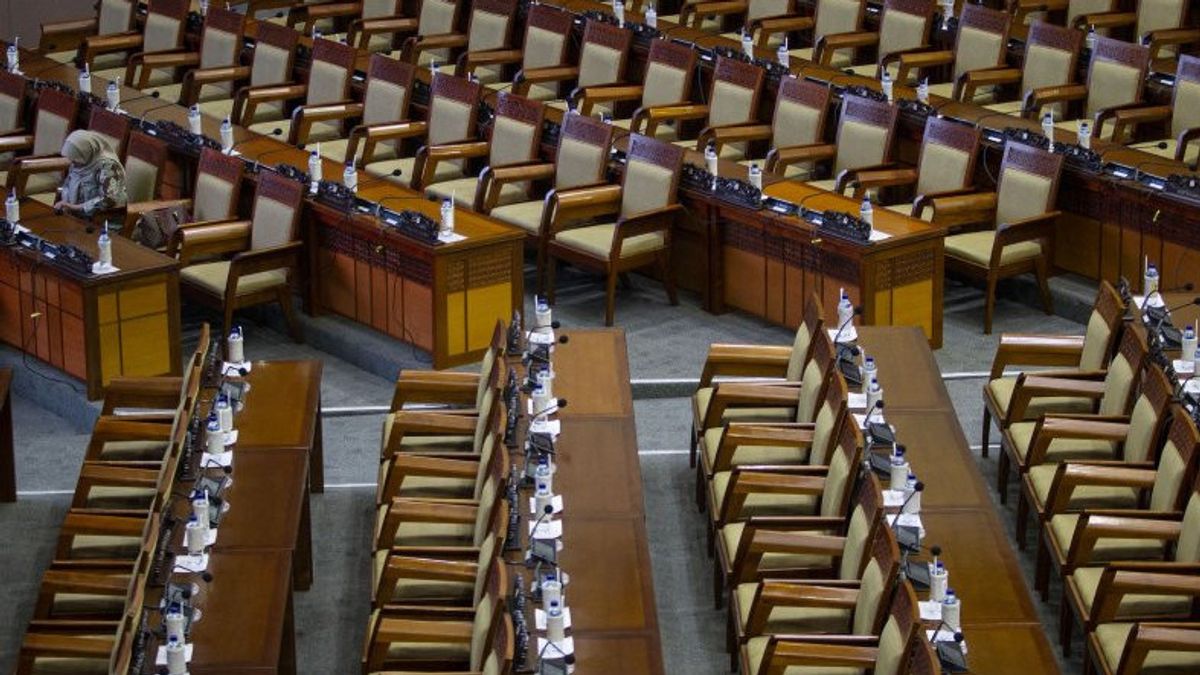JAKARTA - Deputy Chairman of the Legislation Body of the DPR Willy Aditya, claimed that the DPR during this period was very productive in producing law products. One of the laws that has successfully received appreciation from many parties is the Act on the Crime of Sexual Violence.
This means that, according to Willy, the appeal of the chairman of the DPR, Puan Maharani, who stated that the Law (UU) could not only be based on quantity but on quality, both of which were fulfilled.
"Of course the burden of legislation has always been the focus of the DPR, yes, quantity. But today, this period, was very productive, quite a lot," Willy told reporters, Wednesday, April 27.
For information, the performance of legislation in the priority year 2022 recorded that 9 bills were successfully completed. Including the TPKS Bill which was passed by the Chair of the DPR, Puan Maharani.
There are still 11 bills in the discussion stage, 9 registered bills, 3 bills in the drafting stage, 6 bills in the harmonization stage, and 2 bills in the proposal determination stage.
Willy admits that the TPKS Law is fast in its process, but does not leave any substance behind. Within 8 days, he said, the bill was finished at the discussion level.
"Qualitatively, this TPKS is indeed a very joss law. It is substantially qualified in a fast process, the discussion process can be completed in 8 days," said Willy.
The NasDem Party politician also explained the reasons for the discussion of the TPKS Bill to be completed quickly without compromising on quality. First, the similarity of the political will of the DPR and the government to finalize the bill.
Second, the continuous flow of participation and support from elements of society. In the drafting process, explained Willy, the DPR and the government involved 120 civil society groups.
“The political will of the DPR and the government has the same frequency, plus intensive public participation. And the DPR which is open, the hearings are all open. There is nothing to hide," he explained.
In addition, Willy continued, the TPKS Law also regulates sexual violence perpetrators who are still minors. This, he said, was proof of the comprehensiveness of the TPKS Law.
"The right of the perpetrator, if the perpetrator is a child, we will rehabilitate him. Because we know, sexual violence is a causal effect that previously could have been a victim of sexual violence. So that's what we see comprehensively," he said.
Willy explained that the TPKS Law consists of 8 chapters and 93 articles. Article 4 (1) of the TPKS Law includes nine forms of sexual violence, namely non-physical sexual harassment, physical sexual harassment, forced contraception, forced sterilization, forced marriage, sexual torture, sexual exploitation, sexual slavery, electronic-based sexual violence.
Article 4 (2) also regulates 10 criminal acts of sexual violence which include rape and obscene acts. Regarding the absence of an article that regulates abortion, Willy said, it was not detailed because it was included in the Health Act. Meanwhile, the issue of rape is included in the RKUHP.
"So there are 9 main TPKS. The 10 types of KS that were later actually spread out, we're just sticking them here so they're clean and clear. For example, what friends keep saying are abortion and rape. If it's rape, how come we attach it here. That's so (obviously) the existing mens rea and which ones don't exist yet. Why don't we detail it? Because it has actually entered into the RKUHP. If abortion is in the Health Act, if the reference is, "he concluded.
The English, Chinese, Japanese, Arabic, and French versions are automatically generated by the AI. So there may still be inaccuracies in translating, please always see Indonesian as our main language. (system supported by DigitalSiber.id)













